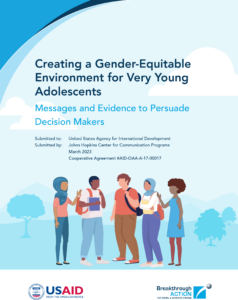In 2022, Breakthrough ACTION conducted informal interviews with gender, sexual and reproductive health (SRH), and youth programming subject matter experts and with youth-led and youth-serving organizations seeking to improve gender equality for very young adolescents (VYAs). The purpose of these interviews was to understand the facilitators and barriers that influence the extent to which stakeholders support and prioritize gender-related policies and programs for VYAs.
The project also conducted a narrative review of publicly available information on gender norms and gender transformative interventions for VYAs, focusing on reports and results from the Global Early Adolescent Study, a multi-country longitudinal study exploring gender socialization and its implications for adolescent health and wellbeing. All of this information was synthesized and transferred into an operational message framework and validated with experts in SRH, gender, and youth.
About the Message Framework
The Creating a Gender-Equitable Environment for Very Young Adolescents: Messages and Evidence to Persuade Decision Makers [ Bahasa Indonesia | English ] is designed for advocates working to increase funding for—and improve the implementation of—programs that seek to create a gender-equitable environment for VYAs (aged 10–14). While gender equality among VYAs is a critical outcome on its own, it is also an important social determinant of health that can support improvements in a broad array of health outcomes, including SRH, violence prevention, mental health, and more.
The document provides a core set of key messages and recommendations that can and should be tailored to specific contexts and stakeholders. It is designed to be used as part of a strategic advocacy process, such as SMART Advocacy, particularly during the process of developing key “asks” and compiling supporting evidence. Users can adapt the messages provided to create advocacy materials, events, and campaigns supporting VYA gender equity.
VYA Pilot Package
Related Resources
- Addressing Gender Inequity During Early Adolescence in Indonesia: Implications for Programs and Policies from a Human-Centered Design Process
- Design & Test Reports from Indonesia and the Democratic Republic of the Congo
- Engaging Parents in Sexual and Reproductive Health: Programs for Very Young Adolescents in the Democratic Republic of the Congo
- Leveraging Human-Centered Design to Improve Gender-Equitable Adolescent Programming in the DRC and Indonesia: Process Brief and Learnings


